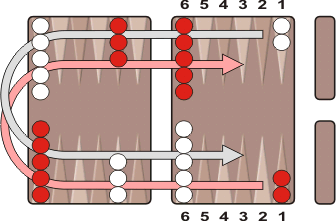Shesh Besh
Shesh Besh is a Turkish game very similar to Western backgammon. A summary of the differences between the two games is given at the bottom of this page.
Setup: The game is set up the same is in backgammon. Each player has 2 checkers on the opponent's one-point, 5 checkers on the opponent's twelve-point, 3 checkers on his own eight-point, and 5 checkers on his six-point.

Object: The object of the game is to move all of your checkers around the board to your own home table and then bear them off. The first player to bear off all of his checkers wins the game.
To start: Both players roll one die and the higher roller goes first. Then that player rolls the dice again to begin his turn.
Movement: Movement of the checkers is the same as in backgammon. The roll of the dice indicates how many points, or pips, the player is to move his checkers. The following rules apply:
A checker may be moved only to an open point, one that is not occupied by two or more opposing checkers.
The numbers on the two dice constitute separate moves. For example, if a player rolls 5 and 3, he may move one checker five spaces to an open point and another checker three spaces to an open point, or he may move the one checker a total of eight spaces to an open point, but only if the intermediate point (either three or five spaces from the starting point) is also open.
Doubles are played twice. For example, a roll of 6-6 means the player has four sixes to use.
You must use both numbers of a roll if possible, or all four numbers in the case of doubles.
Hitting: A single checker on a point is called a blot. If an opposing checker lands on a blot, the blot is hit and placed on the bar.
Entering from the bar: Any time you have one or more checkers on the bar, your first obligation is to enter those checker(s) into the opposing home board. You enter a checker by moving it to an open point corresponding to one of the numbers on the rolled dice. If you are able to enter some but not all of your checkers, you must enter as many as you can then give up the remainder of your turn.
Bearing Off: Once you have moved all fifteen of your checkers into your home board, you may begin bearing off. You bear off rolling a number that corresponds to the point on which the checker resides, and then removing that checker from the board.
If there is no checker on the point indicated by the roll, then you must make a legal move using a checker on a higher-numbered point. If there are no checkers on higher-numbered points, you are permitted to remove a checker from the highest point that has a checker.
Scoring: The first player to bear off all fifteen checkers wins the game. If the losing player has borne off at least one checker, he loses only one point. If the losing player has not borne off any checkers, he loses two points ("Mars"); or, if he still has a checker on the bar, he loses three points ("Turkish Mars").
There is no doubling in this game.




